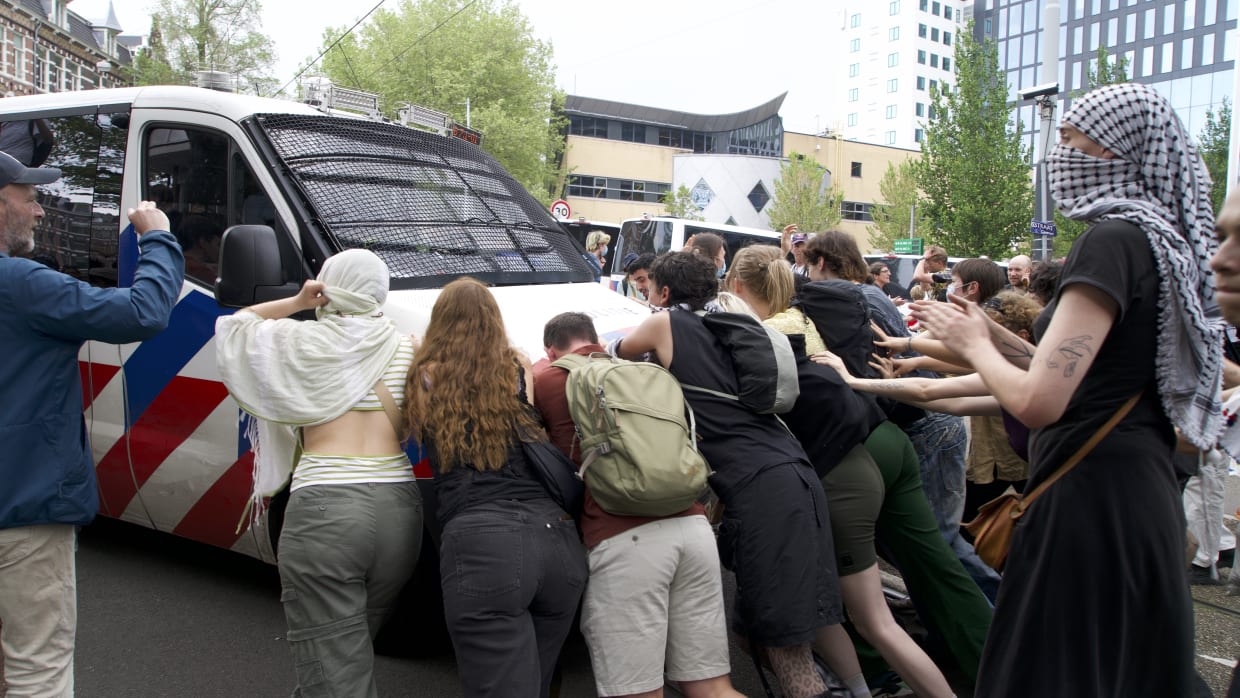
Opinion | “It’s not about the broken screens, it's about the genocide of the Palestinians”
Who is responsible for the broken screens or the overturned coffee machine at the demonstration for Gaza is not important, UvA junior lecturer Abhiraj Goswami argues in this opinion piece. ‘What matters is the complicity of Dutch academic institutions in genocide and the failure to hold their Israeli counterparts accountable.’
Vandalism/ property damage/ defacement/ defilement – one act, countless names, and a reason for the Mobiele Eenheid(ME) to unleash an unjustifiable and unprecedented magnitude of violence upon students demonstrating peacefully. This has happened thrice over the past week, at the behest of a trigger-happy College van Bestuur (CvB) that clearly prefers brutal evictions over good-faith negotiations.
Deciphering from the language used by the CvB and the subsequent conversations that have arisen owing to their public statements, ‘student safety’ and ‘damage to property’ seem to be the motivations for their trigger-happiness. While the façade of ‘student safety’ instituted by the CvB has been amply tackled and responded to by the protesters vis-à-vis their speeches and chants, the discourse on ‘damage to property’ seems to have raised questions and divided camps. A lot of focus is currently being placed on rigorously assessing shredded carpet, unearthed cobblestones, smashed screens and crumbling cabinets – all while the University continues to cooperate with Israeli institutions complicit in genocide. “Whose safety?” is a burning question that confronts the CvB, who continue to escape accountability while altering the optics. But what of the vandalism clause, and why is giving into this discussion detrimental to the ongoing movement?
Shifting the focus from what should be discussed to what is being discussed is the oldest trick in the playbook of hierarchical repression, and crying wolf over damaged property is the easiest way to get there. Mentions of vandalism immediately beget a series of sub-questions, no matter the context. What was broken? Who was responsible? Who were the victims? How costly are the damages? How should we replace them? More often than not, the conversation enters a loop and stagnates, eventually fizzling out with whimpers of lamentation towards the inanimate objects affected. Multiple inquiries, investigations and chatter is dedicated to getting to the bottom of things, and separate those responsible from those circumstantially present.
This whole process dominates the attention economy and exhausts our emotional and intellectual capacity to care for anything that lies outside of the current frame of discussion. As talking points transform and the newly formulated agendas are amplified via media channels, each and every individual – from those demonstrating to the public at large that watches and opines, is affected. Soon, the genocide of Palestinians and the scholasticide in Gaza, which triggered the numerous encampments, protests and demands for divestment, become background noise.
It must be said that while the Israeli apartheid and siege in Gaza has been the primary trigger for non-violent student action, a compounding catalyst is the blatant neoliberalism of the university itself. A salient feature of neoliberal moralism is the primacy of property over people, which is on full display at the UvA. There has been little to no condemnation of the unprovoked violence that the students have had to bear, by the pepper sprays and batons of the ME. Instead, the CvB published numerous communiques outlining their concern regarding the continuation of business matters, without taking into account the severe physical and mental harm they caused to peaceful protesters.
While dialogue and de-escalation have been at the crux of the approach undertaken by students and staff, the CvB not only refused to acknowledge this fact but also spoil the process by greenlighting excessive force. This shows that what ultimately matters to them is the continuation of regular academic life, a faux normalcy that relegates Palestinian solidarity to a mere performance and not a serious demand for structural and ethical re-orientation. Central to this faux normalcy is the availability of university infrastructure – property.
The encampment of Monday, 6th May, on the Roeterseilandcampus grounds, was not an isolated, momentary development but a collective response by the student community towards the apathy displayed by the UvA towards Palestinians in Gaza and their violent erasure. The rapid, anti-war signalling that the University undertook when condemning Russian aggression in 2022, stands in start contrast. Keeping aside the undertones of racism that characterizes such an asymmetry, the Ukraine case is a clear example that cutting ties, divestment and academic boycotts are entirely possible, and so too within a very short timeframe.
When questioned about the stark difference in approaches, UvA has resorted to maintaining that the University is apolitical – an absurd claim. The decision to cancel Palestinian scholarly events is a political decision. The decision to invite Dutch military dignitaries to discuss the looming spectre of war in Europe is a political decision. Similarly, the decision to malign demonstrators that clearly belong to and are proud of their involvement with the University so as to maintain neoliberal moralism, is a political decision.
The real story here is not about who smashes a window. In-fact, none of this is about windows or the broken display screens or an overturned coffee machine. The protests, demonstrations, walkouts and encampments focus on one thing only: the complicity of Dutch academic institutions in genocide and the failure to hold their Israeli counterparts accountable via disclosing ties, divesting and undertaking an academic boycott. All efforts to paint the Palestinian cause as an abstraction must be cast aside, and the CvB must lend an honest ear to its students and staff – those who uphold the ethos of the University.
Abhiraj Goswami is a Junior Lecturer at the Department of Political Science, University of Amsterdam. His research interests include but are not limited to political epistemology, resistance studies and post-structuralism in International Relations.

